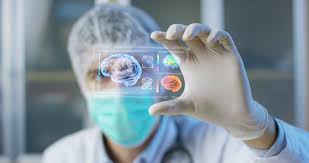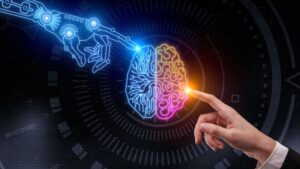Transforming Diagnostics, Testing, and Drug Discovery

The integration of Artificial Intelligence (AI) in healthcare is revolutionizing how we approach diagnostics, develop new medical tests, and conduct drug discovery. With the power of machine learning, big data analytics, and predictive modeling, AI is reshaping the healthcare landscape, offering faster, more accurate solutions while reducing costs. This article explores how AI is advancing healthcare, emphasizing its applications in new tests and the development of life-saving medications.
What is Artificial Intelligence in Healthcare?
Artificial Intelligence in healthcare refers to the use of complex algorithms and software to emulate human cognition in analyzing medical data. Its applications range from detecting diseases at early stages to personalizing treatments based on patient-specific data.
Why AI in Healthcare is a Game Changer
The healthcare sector generates massive amounts of data daily. AI algorithms can analyze this data in seconds, identifying patterns and making predictions that were previously unimaginable. This capability makes AI indispensable for advancing diagnostics, preventive care, and therapeutic solutions.
AI in Diagnostics: Revolutionizing Medical Tests
Early Detection with AI-Powered Tools
AI has significantly improved the early detection of diseases like cancer, Alzheimer’s, and heart disease. Algorithms trained on millions of patient records can detect subtle anomalies in imaging or lab results, often before human clinicians can.
Examples of AI in Diagnostics:
- Radiology: AI tools like Google’s DeepMind Health analyze CT scans and X-rays to identify tumors with remarkable accuracy.
- Pathology: AI algorithms examine biopsy slides, detecting cancer cells with precision, reducing human error.
- Wearables: Devices like smartwatches use AI to monitor heart rate irregularities, alerting users to potential arrhythmias.
The Role of AI in Personalized Testing
AI is also driving personalized medicine by tailoring diagnostic tests based on individual genetic profiles. These advancements are enabling doctors to recommend treatments that are more likely to succeed for each patient.
Artificial Intelligence in Drug Discovery
The traditional drug discovery process is time-consuming and expensive, often taking over a decade and billions of dollars to bring a drug to market. AI is streamlining this process, offering unprecedented efficiency and accuracy.

How AI is Accelerating Drug Discovery
- Target Identification: AI analyzes genetic and molecular data to identify potential drug targets with high accuracy.
- Drug Design: Algorithms simulate how drugs interact with biological targets, optimizing compounds for efficacy and safety.
- Clinical Trials Optimization: AI identifies suitable candidates for clinical trials, predicting their likelihood of success based on historical data.
Notable AI Applications in Drug Development
- AlphaFold: Developed by DeepMind, this tool predicts protein structures, accelerating research into treatments for complex diseases.
- Insilico Medicine: This AI platform has already identified several promising drug candidates for diseases like cancer and fibrosis.
Reducing Costs and Timeframes
AI-powered platforms significantly reduce the cost and time of drug discovery by automating repetitive tasks and enabling researchers to focus on innovative solutions. For instance, AI can screen millions of compounds in days instead of years.
The Role of AI in Developing New Medical Tests
AI’s contribution to creating advanced diagnostic tools is immense. From imaging analysis to genetic testing, AI enhances accuracy and accessibility.
Advanced Imaging Techniques
Medical imaging, powered by AI, is evolving rapidly. For instance:
- MRI and CT Scan Enhancement: AI algorithms can identify issues that might be overlooked by human radiologists.
- Point-of-Care Ultrasound (POCUS): AI-guided portable devices bring high-quality imaging to remote areas, addressing disparities in healthcare access.
AI in Genomic Testing
AI has made genomic testing more efficient and affordable, facilitating personalized medicine. By analyzing genetic data, AI identifies predispositions to diseases, guiding preventive measures and early interventions.

Ethical and Regulatory Challenges in AI-Powered Healthcare
While the benefits of AI in healthcare are immense, challenges remain:
- Data Privacy: Ensuring patient data is secure from breaches.
- Bias in Algorithms: Addressing biases in AI models to ensure equitable healthcare solutions.
- Regulatory Compliance: Aligning AI tools with global healthcare standards.
Addressing Challenges for a Better Future
To fully harness AI’s potential, regulatory frameworks must evolve alongside technology. Transparency in algorithm development and robust data protection measures are essential for building trust.
Conclusion: The Future of AI in Healthcare
The potential of artificial intelligence in healthcare is boundless, from revolutionizing diagnostics to advancing drug discovery and creating sophisticated medical tests. As AI continues to evolve, its role in delivering precision medicine, improving patient outcomes, and reducing costs will expand.
Investments in AI-powered healthcare technologies are not just investments in innovation—they are investments in a healthier, more efficient future. While challenges like data privacy and regulatory hurdles exist, the progress made thus far is a testament to AI’s transformative impact on healthcare.
The Next Steps in AI-Driven Healthcare Innovation
Healthcare providers, researchers, and policymakers must collaborate to ensure that AI technologies are accessible, ethical, and beneficial for all. With these efforts, AI will undoubtedly remain a cornerstone of modern healthcare innovation.
Artificial Intelligence in Healthcare – Artificial Intelligence in Healthcare https://youtu.be/mkiDXTS6-mU?si=KXUGju33HI2ipM_G
The Role of Artificial Intelligence in Breast Cancer Diagnosis




Pingback: Health and the Use of Telemedicine and Remote Care - VarietyWeb